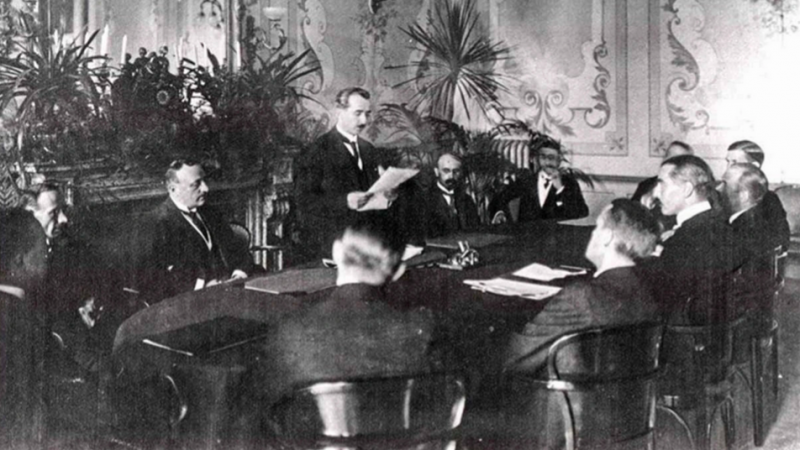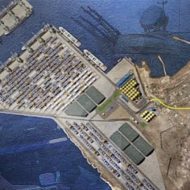The Lausanne Treaty was signed on July 24, 1923 between Türkiye and the Allied Powers.
The Treaty replaced the earlier Treaty of Sèvres, which had been signed in 1920 after the defeat of the Ottoman Empire in the World War I but never ratified thanks to the Independence War led by Mustafa Kemal Atatürk.
The Treaty signed between the revolutionary government in Ankara, which led the Independence War, and the Allied Powers upon the success of the independence struggle resulted in the international recognition of the Republic of Türkiye as a sovereign state.
United World International author, political scientist and historian Mehmet Perinçek made an evaluation of the Treaty, focusing on the cooperation between Türkiye and the Soviet Russia.
Türkiye and the Soviet Russia at the same side of the front
In the context of the Lausanne Conference, there were two sides. One was the Allied Powers aiming to share Türkiye’s territory among themselves. The other was the Soviet Russia alongside Türkiye in the camp of the “shared countries”. Soviet Russia had shown its support for Türkiye during Türkiye’s Independence War in aspects of military, financial, and international relations. When it came to getting the imperialist states to accept Türkiye as an independent country by signing an agreement at the Lausanne Conference, Soviet Russia again sided with Türkiye.
“The Allied Powers tried to prevent Soviet Russia’s participation”
The Allied Powers tried to prevent Soviet Russia from participating in the Lausanne Conference with the intention of leaving Türkiye isolated and weak, pressuring it into accepting harsher terms. However, Türkiye consistently emphasized the need for Soviet Russia’s presence at the conference through numerous diplomatic notes. Owing to the efforts of both Türkiye and Soviet Russia, the Lausanne Conference only allowed Soviet Russia to participate in the negotiations on the Turkish Straits.
Lenin’s strategy on the Lausanne Conference
Lenin himself revealed the strategy and objectives of Soviet Russia in the Lausanne Conference. These included as a first step ensuring that the Allied Powers accepted Türkiye’s national demands. Additionally, the goal was to ensure security and peace in the Black Sea by closing the Straits to the warships of imperialist states.
Chicherin: More Turkish than the Turks
Chicherin, the People’s Commissar for Foreign Affairs of the Soviet Union, worked almost like an official representative of the Turkish delegation. Lord Curzon, the British Foreign Secretary, even commented that Chicherin seemed more Turkish than the Turks and jokingly said he would believe Chicherin was “wearing a fez and presenting himself as Ismet Pasha”. Ismet Pasha, in various conversations, acknowledged that Chicherin had defended Türkiye almost more than the Turkish delegation did.
I personally read all the reports Chicherin sent to Moscow and received from there. The Lausanne Conference was not limited to formal meetings but also included intensive behind-the-scenes work by delegation officials in hotels, cafes, restaurants, and on the streets. Based on these reports, it is evident that Soviet Russia provided strong support for Türkiye both during the discussions concerning the Straits and during the informal talks behind-the-scenes. Türkiye’s sovereignty over the Straits was crucial for peace in the Black Sea. Chicherin genuinely advocated for the full Turkish sovereignty over the Straits. Chicherin even remarked, “A disarmed Türkiye in the Straits would become putty in the hands of great powers. A sovereign Türkiye would be the bedrock of peace.”
A victory for the oppressed peoples
The Treaty of Lausanne is a great victory not only for Türkiye’s full sovereignty, but also for the Soviet Union and all oppressed peoples.
Türkiye’s subjugation under imperialist states or the establishment of puppet states such as the so-called “Kurdistan” or “Greater Armenia” would have posed a threat to the Soviet Union. The imperialist powers intended to use Türkiye as a base against the Soviet Revolution and other awakening Eurasian and Asian civilizations.
Assassination of Vorovsky
Imperialism has not changed in its stance against Turkish-Russian cooperation. 100 years ago, imperialism sought to disrupt Türkiye-Russia relations through an assassination of the Soviet representative, Vatslav Vatslavovich Vorovsky in May 1923. That was also a message to Türkiye.
During that period Ismet Pasha received numerous assassination threats as well. The assassination aimed to leave Türkiye isolated at the Lausanne Conference by hindering cooperation between Türkiye and the Soviet Union. It is worth noting that Ismet Pasha personally attended Varovsky’s funeral expressing solidarity with Soviet Russia.









Leave a Reply